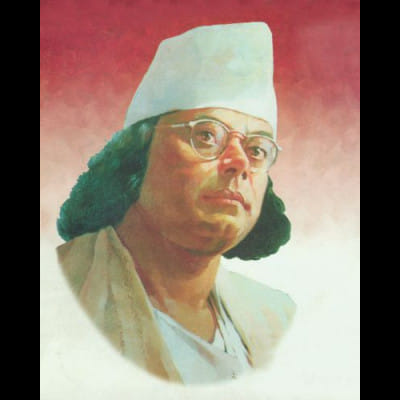Close encounters with Nazrul

Poet Kazi Nazrul Islam's residence at 330-B Dhanmondi, where he lived since his repatriation from West Bengal on May 20, 1972, was a major attraction for me. I can never forget the joyful celebration of the poet's 73rd birthday on May 25 that year. As a student of Dhaka University, whenever I could snatch time between classes, I went to see Nazrul at his two-storied house at Dhanmondi, where he spent his last years.
At one point, I used to visit him five days a week and frequently found him slowly moving about his house, and looking around with his expressive big eyes. He looked helpless. I cannot figure out exactly what it was about him that attracted me so profoundly. I tried to sing for him with the harmonium, often joined by Rashedul Hasan Matin, grandson of Mawlana Bhasani.
It wasn't an ordinary day. I had no idea about the strength of his senses then. While I was singing, he was walking in the veranda. Then he started walking back and forth from the veranda to the room and sometimes sitting on the bed. Then, he approached the open railing in the veranda and was trying to throw a stone out, but failed because he was too weak to do so. I wondered how a once strong man who shook the foundations of British rule had turned so feeble.

As I continued singing, he picked up a notebook from above the harmonium, quickly flipped through some of the pages and again began pacing around. He did this several times. I sensed his dislike for the songs. Once, he rushed to the harmonium, picked the notebook, turned over some pages and left it on the harmonium. I tried singing passionately a song opened by the poet. He sat on the bed and listened attentively until I completed the song – “Ami Daar Khule Aar Rakhbona Paliye Jabe go”. He suddenly became calm.
A few days later I was watching the television channel -- DD-7 (Doordarshan, broadcast from India). All of a sudden, on the screen I saw the poet's ailing wife Promila Devi lying on her bed while Nazrul kept a watch on her. Singer Renu Bhoumik was singing -- “Ami Daar Khule Aar Rakhbona Paliye Jabe Go”.
The loss of his son on one hand and Promila Devi's illness on the other, made his life painful. Agony turns people emotional. That possibly prompted the poet to write the lyrics of his last song:
“Jahara Amar Bichar Koreche /
Bhul Koriache Jani /
Tahader Torey Rekhe Genu Mo'r /
Bidayer Gaan Khani”.
I will never forget the day of his demise. The whole of Dhaka was in mourning. People from all walks, including Dhaka University students, rushed to the then PG Hospital to get a last glimpse of the poet. Could I be an exception? I recalled Dadu, as we called him, accompanied by Rashedul Hasan Matin, the house caretaker Khaleq and Keshada.
We often shared happy moments in Nazrul's Dhanmondi house. We used to hold him close. Touched, he would laugh loudly, a scene that would make us happy.
Dadu is no more in that beloved house, which is now the Nazrul Institute. Why can't I today go to that house – is a question that haunts me now and then.
The writer is a prominent Nazrul singer.

 For all latest news, follow The Daily Star's Google News channel.
For all latest news, follow The Daily Star's Google News channel. 



Comments